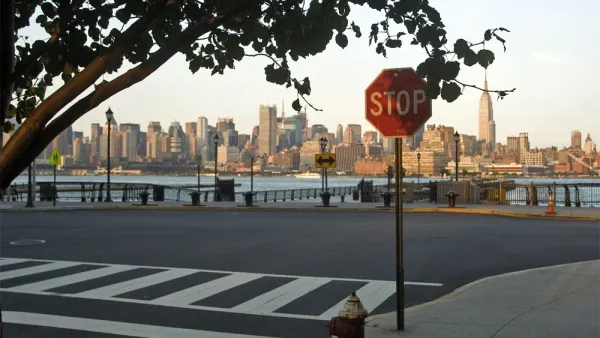Community / Economic Development
Better Block Goes Small Town
From Dallas to Denver, Las Vegas to Oklahoma City... and now tiny North Adams, Mass. The wildly successful Better Block model has primarily spawned projects in large urban areas, but small towns are starting to pay attention.
Dream of Suburban D.C. Light Rail a Nightmare to Local Residents
At an open house organized to update the public on plans to build a 16-mile light rail line linking spurs of D.C.'s subway system in suburban Maryland, planners' visions of smart growth where seen as a developer-driven nightmare by local residents.

Asia's Emergence in One Stunning Map
A simple graphic posted to Reddit recently shows that more than half of the world's total population resides within a circle drawn over Asia. For Matthew Yglesias, it "underscores the fundamental truth of 21st-century economics."
Build, Don't Bulldoze, Slums to Reduce Poverty
Indian journalist Swaminathan S. Anklesaria Aiyar examines the opportunities that informal settlements provide to the poor and unskilled for ascending economic and social ladders.
The Ominous Side of America's Urban Comeback
"The comeback of the urban core is a striking reversal of long-term trends," proclaims Richard Florida. Although this rebound is good for urban growth and prosperity, it hasn't been able to solve enduring problems of poverty and disadvantage.
Kotkin Crushes His (Imaginary) Enemies
Many planners these days are promoting higher densities, especially in urban cores. Urban scholar Joel Kotkin inexplicably takes this trend to mean that a "cult" of planners favors bone-crushing crowds that would turn US cities into slums.
Does Urbanization Make Nations Less Relevant?
In the pre-modern era, city-states were the engines of global trade and diplomacy. As rapid urbanization drives globalization outside the structures of international frameworks, cities are returning to the fore as transnational actors.
The Dynamic Potential of Urbanism Without Effort
Chuck Wolfe summarizes a major tenet of his new book and suggests we risk ignoring the back story of urban forms and functions by failing to truly understand the traditional relationships between people and place.
Slackers No More, Generation X Redefines Governance and Outreach
As they move into positions of leadership in their communities and in the public sector, a generation once labelled as "slackers" is helping to change the relationship between governments and their citizens, reports Rob Gurwitt.
Largest Passivhaus Development in UK Underway
Featuring 150 Passivhaus dwelling units set amid wetlands and orchards, Architype's development in Herefordshire will also create jobs through an off-site but local prefabrication factory.
Segregation Doesn't Only Harm the Poor
Emily Badger looks at recent research that shows that racial and economic segregation harms not only minority and low-income families, but also those that've fled to affluent areas.

Reverse Migration Threatens New Jersey Suburbs
After a half century of growth driven by families fleeing New York City, New Jersey's northern suburbs face an uncertain future as young families, young professionals and retirees find a resurgent Big Apple more to their liking.
Unlocking the Value of Legacy Assets
As cash strapped communities look to maximize their return on investment, a potent argument can be made for leveraging significant investments already made in a city's legacy assets to drive economic development.
Website Provides Tools to Resurrect Abandoned Buildings
The world is full of millions of abandoned buildings; unused resources that drag down their surrounding communities. One website aims to provide advocates with the tools to reactivate them, writes Ben Schiller.
In D.C., Nearby Projects Reveal Advantages of Effective Outreach
The divergent routes to approvals for two apartment complex developments just a mile apart show how important it is to engage both government and the surrounding community early in the process.
Enterprise or Chaos? Cairo's DIY Urbanism
Michael Kimmelman examines the race to rebuild and redefine post-revolutionary Cairo, where residents are recreating the city and civic society, and reclaiming public spaces, from the bottom-up.
Do Immigrants Help or Hurt America's Urban Economies?
As Congress debates immigration reform, Richard Florida explains why more liberal policies could be a boon for America's cities by examining the connection between foreign-born populations and economic outcomes.
Greek Financial Crisis Inspires Inexpensive Urbanism
Vivian Doumpa looks at three examples of bottom-up urban interventions completed in Greece, which show that a font of citizen spirit and ingenuity can help overcome the most draconian austerity measures.
Are Nefarious Forces Behind the Transformation of Downtown Brooklyn?
Doug Henwood explains how "elite bodies", rather than pure "market forces", guide the growth of New York City. He begins his story with the Regional Plan Association's influential 1929 plan and focuses on the transformation of Downtown Brooklyn.
Will Vitality Be Trampled in the Rush to 'Modernize' Midtown Manhattan?
In a scathing op-ed for The New York Times, architect Robert Stern challenges the city's drive to densify East Midtown without paying the requisite attention to preservation, infrastructure, and the elements that give vitality to great cities.
Pagination
Urban Design for Planners 1: Software Tools
This six-course series explores essential urban design concepts using open source software and equips planners with the tools they need to participate fully in the urban design process.
Planning for Universal Design
Learn the tools for implementing Universal Design in planning regulations.
EMC Planning Group, Inc.
Planetizen
Planetizen
Mpact (formerly Rail~Volution)
Great Falls Development Authority, Inc.
HUDs Office of Policy Development and Research
NYU Wagner Graduate School of Public Service


































